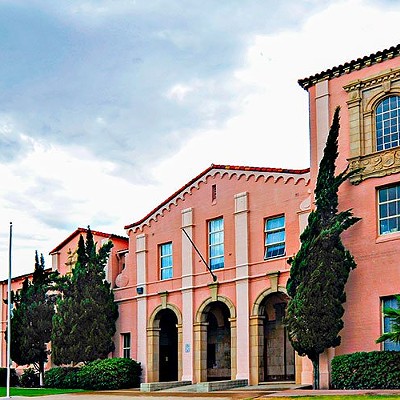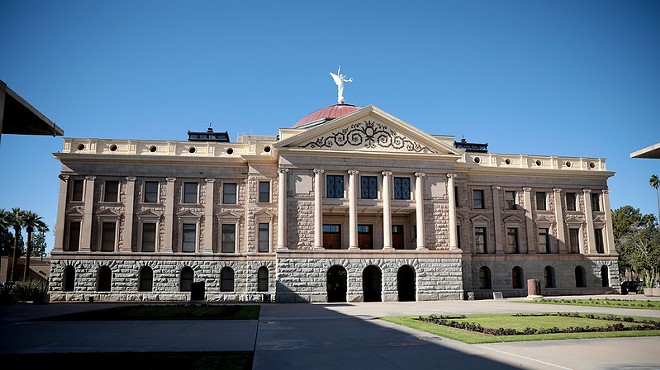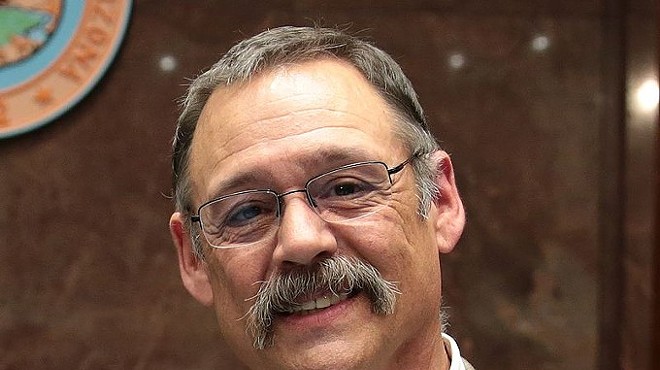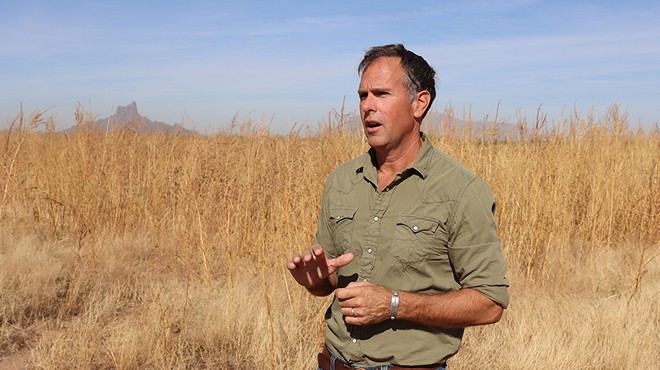Wednesday, September 14, 2011
A Top 9 Rundown on the Ethnic Studies Hearings, with Audio
Today is the final portion of the three-part administrative hearing on the Tucson Unified School District's appeal of Superintendent of Public Instruction John Huppenthal's findings on the district's Mexican-American studies classes. The hearing began at 8 a.m. at the Office of Administrative Hearings, 1400 W. Washington St., Suite 101, in Phoenix.
Rather than dwell on the decision, expected the end of this month, which may determine the fate of TUSD's Mexican-American studies classes, experience tells me that it's best to keep an eye on the federal lawsuit filed by 11 ethnic-studies teachers, and their attorney Richard Martinez. As federal lawsuits go—really any lawsuit—this one is just getting started and will determine the constitutionality the anti-ethnic studies classes and thus the future of the Mexican American Studies classes.
The past two administrative hearings up in Phoenix offered different glimpses into how some members of TUSD's governing board feel about the Mexican-American studies program; how the state handled the audit it ordered that produced a positive result it wasn't so happy about; and the elephants in the room that the state's attorney worked really hard to pretend don't exist—like SB 1070 and racism.
Here's a rundown:
1. The first hearing on Friday, Aug. 19, began with testimony from the Arizona Department of Education's John Stollar explaining curriculum problems with MAS—since curriculum involves one of the state's findings, although curriculum has nothing to do with the anti-ethnic studies law that's brought TUSD and the state to this point. Stollar's testimony was hardly mesmerizing, and that's OK, because a few hours later, we had the stars of the day — TUSD governing board members Mark Stegeman and Michael Hicks — both called in as expert witnesses for the state. Stegeman's testimony focused on personal notes he took when he visited a couple of MAS classrooms, and the state's attorney focused on Stegeman's observations that he felt the classes exhibited collective-identity cult-like behaviors, especially because of the Unidas clap and chant that some of the classes do before they begin to learn. To prove Stegeman's point, in his notes, he wrote about Eric Hoffer, a writer who focused on collective behaviors and whose writing was used by groups like the John Birch Society to put down the Civil Rights Movement. As news spread about Stegeman's testimony, a collective gasp may have been heard throughout Tucson, especially, The Range suspects, by some progressives who had continued to think Stegeman was somehow the target of civil rights activists gone mad.
2. After Stegeman's testimony, Michael Hicks testified, but nothing earth-shattering came from the governing board member who has already made it clear he is not a supporter of MAS and would rather get rid of the program. The state, however, through a TUSD records request, went over e-mail with Hicks that was exchanged between Tucson civil rights activist and former UA professor Salomón Baldenegro Sr. and MAS teacher Sally Rusk that focused on an opinion piece Baldenegro wrote on the history of prejudice against bilingualism. Baldenegro sends these essays out to many different people, including some of us at the Weekly. They are often reflections on what is going on in our state, as well as lessons on history, racism, Chicano history and the Civil Rights Movement. The state's attorney attempted to draw a conclusion that Rusk uses essays like these in her classroom, and to get Hicks to say he thought they were terrible and violated the state's anti-ethnic studies law—after all, the truth hurts and makes kids distrust good people like Russell Pearce, and that's bad, because it leads to recall elections. OK, so the state's attorney didn't go that far, but close. TUSD's attorney objected before Hicks could answer, and the judge agreed and struck it from the record.
3. The final witness from the first day of the hearing that continued into the second day was ADE's Kathryn Hrabluk, Huppenthal's associate superintendent. Her testimony, while often focused on curriculum, like Stollar's testimony, also focused on how the state hired Cambium Learning to conduct the audit, and why the state wasn't happy with what it considered a deeply flawed process that led to Cambium's report that the MAS classes were overall great and didn't violate the anti-ethnic studies law. Hrabluk admitted they began to have concerns when questions from the public (ethnic-studies supporters) brought up concerns about the Cambium person heading the audit. The public spotlight even spooked Cambium, who tried to get out of the agreement, but the state held them to it, and even through there was regular communication between the state and Cambium's auditors, Hrabluk feigned that the audit was not done correctly. She did admit that they state has had other contracts with Cambium and was satisfied with that other work.
4. During the second administrative hearing, the Tucson Weekly was in the middle of going to press, but we received notes from ASU Professor Manuel Hernandez and finally got to hear the audio we've put together for you below. Hrabluk continued with her testimony, and one thing was made clear, and never disputed. She created a picture of a relationship between the state and the auditors that had included communication, and made it seem as if there was plenty of time to rework any issues with the audit. But that, ladies and gentleman, is what is called a convenient afterthought. While folks like Hrabluk and Stollar never visited a MAS classroom, she said the materials she reviewed, much of it provided to the state by community members vehemently against MAS, made her feel the classes build resentment, etc., and break the anti-ethnic studies law. Finally, the TUSD attorney asked, "Do you know why (deadline) time was not extended (to the auditors)" if you didn't feel the audit was being done correctly to begin with? "There was a sense of urgency," Hrabluk answered. The attorney also brought up that the only stakeholders Hrublak's office interviewed were those against ethnic studies.
5. The next witness for the state was TUSD Superintendent John Pedicone. What's been making the blog rounds from Pedicone's testimony soon involves when the state's attorney asked him about MEChA. Then he brought to Pedicone's attention a memo from Lupita Garcia, an assistant superintendent at TUSD, who became responsible for the MAS program in March 2011, among other duties. The e-mail from Garcia to Pedicone, dated April 12, 2011, was about her concerns that MEChA is a group that promotes antisemitism. "We discussed it, but found no concrete links," Pedicone said of his discussion with Garica. The state's attorney wanted to enter the e-mail as evidence showing radical influences over the students, but the TUSD attorney objected, and the judge agreed he did not see a tie-in and would not admit it into evidence.
6. The TUSD attorney continued questioning Pedicone, asking him about the MAS classes he's visited, and that, no, he didn't see any violation of the anti-ethnic studies law take place. Pedicone also discussed a meeting he had with representatives from ADE and Michael Hicks on the future of the MAS program, and how ADE officials could help. Pedicone said Huppenthal's interest in getting rid of one particular class was of concern to Pedicone. The state wanted to offer help to build new MAS classes, but Pedicone said no, and that at the moment, the district's concern was getting into compliance with the law. A copy of a test with reference to Aztlan was presented to Pedicone, but the superintendent said the test could not be found and was not in the reading list with MAS—but it was on an African-American studies list.
7. On Sept. 2, the Mexican American Studies Advisory Board issued a statement in response to Garcia's remarks on MEChA:
Last week at the Tucson Unified School District hearing appealing ARS § 15-112, testimony by TUSD Superintendent John Pedicone revealed comments made by Assistant Superintendent Lupita Cavazos-Garcia regarding her opinion of the student organization Movimiento Estudiantil Chicano de Aztlan (MEChA).MEChA is a student group whose mission statement and purpose is to promote higher education, cultura, and historia among youth. The group was founded on the principles of self-determination for the Mexican American community, and advocates that education is a critical pathway for the advancement of social justice. Prominent MEChA members include Secretary of Labor Hilda Solis, Secretary of the Interior Ken Salazar, Congressman Raul Grijalva, and Los Angeles Mayor Antonio Villaraigosa, as well as on a local level many members of the MAS Advisory Board.
Garcia called MEChA “anti-American” and “anti-Semitic,” serious allegations against a well-established organization that promotes the advancement of Latino youth through higher education. Her comments clearly illustrate a profound misunderstanding of the organization and a general lack of support for groups dedicated to the educational advancement of Latino youth.
Despite Garcia’s personally held beliefs, TUSD has placed her in charge of the district’s Mexican American Studies program, which similarly prepares students for advancement in higher education and teaches American history and literature through the Mexican American perspective. Despite the program’s proven efficacy in increasing student achievement, under Garcia’s direction the department has seen a dramatic internal restructuring and a damaging decentralization of program staff.
As the Mexican American Studies Advisory Board, we feel that it is not only necessary to condemn the comments of Dr. Garcia but to also demand that program be removed from her administrative control. It is impossible for any individual with such personal predispositions to objectively oversee a program that so fundamentally counters these beliefs.
8. Sean Arce testified and brought some much-needed perspective to the hearings. Much of his testimony involved his job and duties. The state attorney asked him about critical pedagogy and critical compassionate intellectualism. Describing it, Arce said the model looked at curriculum, but also parent-teacher interactions. Arce offered more interpretation of the curriculum for the state's attorney—and his interpretation is that the status-quo has lower expectations for the Latino. "What we do is about high expectation ... working with students and parents."
Asked to explain what he means by barrio pedagogy, Arce talked about understanding students who are may come from a lower socioeconomic status, and recognizing that they are cultural assets, not a cultural disadvantage. "We view them as positive capital so they can academically succeed." That refers to Latino students? Arce answers, "Yes, but not specifically."
9. One can dream, right? On Aug. 26, the Arizona Capital Times reported that John Huppenthal would not testify during the hearings, but according to TUSD's attorney, that was fine, considering the burden of proof regarding the classes rests on Huppenthal:
Superintendent of Public Instruction John Huppenthal will not testify in the hearing to appeal his finding that Tucson Unified School District’s Mexican-American Studies program is breaking state law.Although Huppenthal was on the district’s final witness list submitted to the administrative law judge, the district’s attorneys said Aug. 23 he won’t be called because they concluded that his testimony would repeat statements made by other witnesses.
Heather Gaines, an attorney representing the district, said opting not to question him won’t be a missed opportunity because the burden of proving the district is out of compliance is on Huppenthal.
“So I am surprised that his counsel opted not to call him since it was his decision,” Gaines said.
Tags: Michael Hicks , Tucson Unified School District , Kathryn Hrabluk , John Stollar , Cambium , NAPE , Arizona Department of Education , Sean Arce , Lupita Garica , MEChA , John Pedicone














